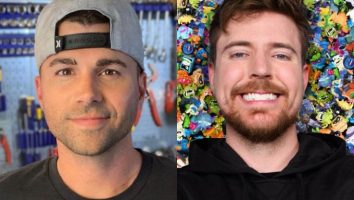If good things come in small packages, then France’s number-one kids specialty channel Canal J is poised to enjoy big gains this year. In September, the 24-hour cable net (which reaches 3.5 million subscribers in France, Belgium and Switzerland) will begin airing five new short series – three more than it aired in all of 2002.
According to Canal J deputy managing director Pierre Belaisch, running more shorts cements the channel’s identity with viewers and provides a breather in between long programming blocks. ‘In a way, shorts are more important than long-format series,’ says Belaisch, who believes that viewers are more likely to make qualitative assumptions about a network when watching them.
While he can offer no figures to buttress this belief (since ratings don’t measure units of time shorter than 15 minutes), Belaisch bases his claim on viewer feedback Canal J received for its 2002 shorts. Though the net did little to promote it, Pas Vu, Pas Pris – a live-action interstitial in which kid hosts corner network personalities and adults à la Candid Camera – drew hundreds of glowing e-mails from viewers, suggesting the untapped effectiveness of short-format programming as a branding tool.
The new shorts are also meant to amplify the net’s distinctiveness as a whimsical, fun and educational kids destination, says Belaisch. A perfect example is Zzzzgarbucksplitzz! – the sound a tomato makes when it hits a wall. Co-produced with Paris-based Grosse Boite Américaine, the stop-frame series (50 x 1.5 minutes) consists of a group of fruits and vegetables synced to an audio track of real kids sounding off on everyday subjects like brushing one’s teeth and more serious topics like racism. Conceptually, a carrot talking about racism is absurd, admits Belaisch; but it’s novel way of teaching kids about the world they live in, which is a Canal J mandate.
No less quirky are: Ralph the Record Rat, a 104 x one-minute short from Alphanim and Vancouver, Canada’s Ocean Sounds Studios (in association with AGOGO) that stars a records-obsessed rodent; and the in-house Flash-animated series Pitch (10 x six minutes), about the misadventures of an alien who’s adopted by an Earthling family.
Canal J is also using shorts to test the long-format potential of properties. For London, England-based Pesky’s Adrenalini Brothers, which documents the mishaps of three inept circus performers, Canal J plans to run eps of the Flash series on the web and TV, soliciting feedback from kids to see if they’d like the show developed into a half-hour program. Canal J is also hoping to use shorts to build pre-awareness for programs. This September, the net will air 52 one-minute Flash episodes of Les Webtoons Kid Paddle – a year before the 26 x half-hour, 2-D animated series from Nocopy and Dupuis debuts.
Beyond shorts, Canal J’s acquisitions team is always hunting for shows to strengthen the net’s lineup. Though the heart of its audience is seven- to 12-year-olds, Canal J cornered the largest share of the four to 14 demo in France from December 30, 2002 to June 15, 2003 with a 7.9% share. Nonetheless, Belaisch says the net would like to improve its standing with the five to seven bracket by adding more gender-neutral shows like Nick’s Rugrats.
Currently, Canal J’s schedule is comprised of 70% acquisitions and 30% co-productions & original programming, with animation accounting for 60% of the lineup. The net pays between US$2,600 and US$8,700 for a half hour of animated or live-action programming. But Belaisch says there’s such a dearth of new, high-quality, gender-neutral animation right now, particularly from the U.S., that he expects co-productions at Canal J to increase. Though it airs Yu-Gi-Oh!, the channel eschews most boys action, favoring tween-skewing fare like Nick’s Rocket Power or Hey Arnold! instead.
Another factor that’s forcing Canal J down the co-pro path is the market presence of multi-national studios/networks like Disney and Warner Bros./Cartoon Network, which use their French channels to distribute their programming in France, leaving Canal J out of the bidding on these new series. To counter that market reality, Belaisch says the net is prepared to put up co-production-level funding for its successful series beyond the conventional run of 26 episodes. ‘If we have a show that’s doing well, why not keep it going?’ asks Belaisch.
This year, Canal J will co-produce second seasons of Marsupilami (with Marathon) and Cedric (with Dupuis), which will begin airing in September and December 2004.





















